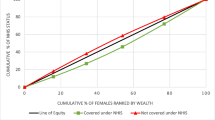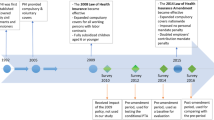Abstract
Under the act that established the National Health Insurance Scheme (NHIS), persons 70 years of age or above are automatically enrolled in the scheme and therefore can access health services free at the point of use. This suggests that the elderly who are unable to afford the premiums of private health insurance can enrol in the NHIS thereby eliminating the possibility of disparities in health insurance coverage. Notwithstanding, few studies have examined health insurance coverage among the elderly in Ghana. The lack of studies on the elderly in Ghana may be due to limited data on this important demographic group. Using data from the Study on Global Ageing and Health and applying logit models, this paper investigates whether the pro-poor exemption policy is eliminating disparities among the elderly aged 70 years and older. The results show that disparities in insurance coverage among the elderly are based on respondents’ socio-economic circumstances, mainly their wealth status. The study underscores the need for eliminating health access disparities among the elderly and suggests that the current premium exemptions alone may not be the solution to eliminating disparities in health insurance coverage among the elderly.
Similar content being viewed by others
References
Aboderin, I. (2012). Global poverty, inequalities and ageing in sub-Saharan Africa: A focus for policy and scholarship. Journal of Population Ageing, 5(2), 87–90. doi:10.1007/s12062-012-9064-x.
Agyepong, I. A., & Adjei, S. (2008). Public social policy development and implementation: A case study of the Ghana National Health Insurance scheme. Health Policy Plan, 23(2), 150–160. doi:10.1093/heapol/czn002.
Ahadzie, W. D. (2009). Baseline survey to assess access of older people to health care, poverty initiatives, pensions and social grants in three regions of Ghana, Accra.
Altschuler, J. (2004). Meaning of housework and other unpaid responsibilities among older women. Journal of Women & Aging, 16(1–2), 143–159. doi:10.1300/J074v16n01_10.
Amin, R., Shah, N. M., & Becker, S. (2010). Socioeconomic factors differentiating maternal and child health-seeking behavior in rural Bangladesh: A cross-sectional analysis. International Journal for Equity in Health, 9, 9. doi:10.1186/1475-9276-9-9.
Amoako Johnson, F., Frempong-Ainguah, F., & Padmadas, S. S. (2015). Two decades of maternity care fee exemption policies in Ghana: Have they benefited the poor? Health Policy and Planning. doi:10.1093/heapol/czv017.
Andersen, R. M., & Newman, J. F. (1973). Societal and individual determinants of medical care utilization in the United States. The Milbank Memorial Fund Quarterly: Health and Society. doi:10.2307/3349613.
Asenso-Okyere, W. K., Anum, A., Osei-Akoto, I., & Adukonu, A. (1998). Cost recovery in Ghana: Are there any changes in health care seeking behaviour? Health Policy and Planning, 13(2), 181–188.
Bastos, A., Casaca, S., Nunes, F., & Pereirinha, J. (2009). Women and poverty: A gender-sensitive approach. The Journal of Socio-Economics, 38(5), 764–778.
Beard, J., Biggs, S., Bloom, D. E., Fried, L. P., Hogan, P. R., Kalache, A., & Olshansky, S. J. (2012). Global Population Ageing: Peril or Promise? 148.
Biritwum, R., Mensah, G., Yawson, A., & Minicuci, N. (2013). Study on global AGEing and Adult Health (SAGE). Wave, 1, 1–111.
Brady, D., & Kall, D. (2008). Nearly universal, but somewhat distinct: The feminization of poverty in affluent Western democracies, 1969–2000. Social Science Research, 37(3), 976–1007. doi:10.1016/j.ssresearch.2007.07.001.
Crooks, D. (2009). Development and Testing of the Elderly Social Vulnerability Index (ESVI): A Composite Indicator to Measure Social Vulnerability in the Jamaican Elderly Population [PhD’s thesis] Miami, FL: Florida International University
Davidson, P. M., DiGiacomo, M., & McGrath, S. J. (2011). The feminization of aging: How will this impact on health outcomes and services? Health Care for Women International, 32(12), 1031–1045. doi:10.1080/07399332.2011.610539.
Derbile, E. K., & Van Der Geest, S. (2013). Repackaging exemptions under National Health Insurance in Ghana: How can access to care for the poor be improved? Health Policy and Planning, 28(6), 586–595. doi:10.1093/heapol/czs098.
Dixon, J., Tenkorang, E. Y., & Luginaah, I. (2011). Ghana’s National Health Insurance Scheme: Helping the poor or leaving them behind? Environment and Planning C: Government and Policy, 29(6), 1102–1115. doi:10.1068/c1119r.
Dixon, J., Luginaah, I., & Mkandawire, P. (2014a). The National Health Insurance Scheme in Ghana’s upper West Region: A gendered perspective of insurance acquisition in a resource-poor setting. Social Science & Medicine, 122, 103–112. doi:10.1016/j.socscimed.2014.10.028.
Dixon, J., Luginaah, I. N., & Mkandawire, P. (2014b). Gendered inequalities within Ghana’s National Health Insurance Scheme: Are poor women being penalized with a late renewal policy? Journal of Health Care for the Poor and Underserved, 25(3), 1005–1020. doi:10.1353/hpu.2014.0122.
Dixon, J., Tenkorang, E. Y., Luginaah, I. N., Kuuire, V. Z., & Boateng, G. O. (2014c). National Health Insurance Scheme enrolment and antenatal care among women in Ghana: Is there any relationship? Tropical Medicine & International Health, 19(1), 98–106.
Gajate-garrido, G., & Owusua, R. (2013). The National Health Insurance Scheme in Ghana Implementation Challenges and Proposed Solutions.
Gelberg, L., Andersen, R. M., & Leake, B. D. (2000). The behavioral model for vulnerable populations: Application to medical care use and outcomes for homeless people. Health Services Research, 34(6), 1273–1302.
Gerdle, B., Björk, J., Henriksson, C., & Bengtsson, A. (2004). Prevalence of current and chronic pain and their influences upon work and healthcare-seeking: A population study. Journal of Rheumatology, 31(7), 1399–1406.
Ghana Statistical Service (GSS). (2013). Population & housing census Report: The elderly in Ghana.
Gnawali, D. P., Pokhrel, S., Sié, A., Sanon, M., De Allegri, M., Souares, A., et al. (2009). The effect of community-based health insurance on the utilization of modern health care services: Evidence from Burkina Faso. Health Policy, 90(2–3), 214–222. doi:10.1016/j.healthpol.2008.09.015.
Government of Ghana (2010). National ageing policy: Ageing with security and dignity. Accra-Ghana.
Gyimah, S. O., Takyi, B. K., & Addai, I. (2006). Challenges to the reproductive health need of African women: On religion and maternal health utlilization in Ghana. Social Science & Medicine (1982), 62(12), 2930–44.
HelpAge-International. (2008). Older people in Africa: A forgotten generation.
ILO. (2014). World Social Protection Report 2014–2015 building economic recovery, inclusive development and a social justice.
Issahaku, P. A., & Neysmith, S. (2013). Policy implications of population ageing in West Africa. International Journal of Sociology and Social Policy, 33(3/4), 186–202.
James, C. D., Hanson, K., McPake, B., Balabanova, D., Gwatkin, D., Hopwood, I., et al. (2006). To retain or remove user fees? Reflection on the current deabte in low- and middle-income countries. Applied Health Economics and Health Policy, 5(3), 137–153. doi:10.2165/00148365-200605030-00001.
Jehu-Appiah, C., Aryeetey, G., Spaan, E., de Hoop, T., Agyepong, I., & Baltussen, R. (2011). Equity aspects of the National Health Insurance Scheme in Ghana: Who is enrolling, who is not and why? Social Science and Medicine, 72(2), 157–165. doi:10.1016/j.socscimed.2010.10.025.
Jehu-Appiah, C., Aryeetey, G., Agyepong, I., Spaan, E., & Baltussen, R. (2012). Household perceptions and their implications for enrolment in the National Health Insurance Scheme in Ghana. Health Policy and Planning, 27(3), 222–233. doi:10.1093/heapol/czr032.
Jowett, M., Deolalikar, a, & Martinsson, P. (2004). Health insurance and treatment seeking behaviour: Evidence from a low income country. Health Economics, 13(9), 845–857.
Kawachi, I., Subramanian, S., & Kim, D. (2008). Social capital and health: A decade of progress and beyond. In I. Kawachi, S. V. Subramanian, & D. Kim (Eds.), Social capital and health (pp. 1–26). New York: Springer.
Kuuire, V. Z., Bisung, E., Rishworth, A., Dixon, J., & Luginaah, I. (2015). Health-seeking behaviour during times of illness: A study among adults in a resource poor setting in Ghana. Journal of Public Health. doi:10.1093/pubmed/fdv176.
Lancet, T. (2012). A manifesto for the world we want. The Lancet, 380(9857), 1881. doi:10.1016/S0140-6736(12)62092-3.
Laporte, A., Nauenberg, E., & Shen, L. (2008). Aging, social capital, and health care utilization in Canada. Health Economics, Policy, and Law, 3(Pt 4), 393–411. doi:10.1017/S1744133108004568.
Lei, X., & Lin, W. (2009). The New Cooperative Medical Scheme in rural China: Does more coverage mean more service and better health? Health Economics. doi:10.1002/hec.1501.
Marmot, M., Friel, S., Bell, R., Houweling, T. A., Taylor, S., & Commission on Social Determinants of Health. (2008). Closing the gap in a generation: Health equity through action on the social determinants of health. The Lancet, 372(9650), 1661–1669.
Mendis, S., Puska, P., & Norrving, B. (2011). Global atlas on cardiovascular disease prevention and control. Geneva: World Health Organization.
Mensah, J., Oppong, J. R., & Schmidt, C. M. (2010). Ghana’s national health insurance scheme in the context of the health MDGs: An empirical evaluation using propensity score matching. Health Economics. doi:10.1002/hec.1633.
National Health Insurance Authority Ghana. (2011). National Health Insurance Authority Annual Report 2010. Retrieved April 1, 2015, from http://www.nhis.gov.gh/_Uploads/dbsAttachedFiles/1(1).pdf
Nyonator, F. (2012). What Ghana is doing for the health of the aged in the government/public and private sector? In Paper presented at the 65th World Health Assembly, Geneva
Nyonator, F., & Kutzin, J. (1999). Health for some? The effects of user fees in the Volta Region of Ghana. Health Policy and Planning, 14(4), 329–341. doi:10.1093/heapol/14.4.329.
Parmar, D., De Allegri, M., Savadogo, G., & Sauerborn, R. (2014a). Do community-based Health Insurance Schemes fulfil the promise of equity? A study from Burkina Faso. Health Policy and Planning, 29(1), 76–84. doi:10.1093/heapol/czs136.
Parmar, D., Williams, G., Dkhimi, F., Ndiaye, A., Asante, F. A., Arhinful, D. K., et al. (2014b). Enrolment of older people in social health protection programs in West Africa—does social exclusion play a part? Social Science & Medicine, 1982. doi:10.1016/j.socscimed.2014.08.011.
Ramlagan, S., Peltzer, K., & Phaswana-mafuya, N. (2013). Social capital and health among older adults in South Africa. BMC Geriatrics, 13(1), 1.
Sarpong, N., Loag, W., Fobil, J., Meyer, C. G., Adu-Sarkodie, Y., May, J., et al. (2010). National health insurance coverage and socio-economic status in a rural district of Ghana. Tropical Medicine and International Health. doi:10.1111/j.1365-3156.2009.02439.x.
Tenkorang, E. Y., & Owusu, Ga. (2010). Correlates of HIV testing among women in Ghana: Some evidence from the Demographic and Health Surveys. AIDS Care, 22(3), 296–307.
United Nations, D. of E. and S. A. P. (2007). World Population Ageing 2007. Population New York
United Nations: Department of Social and Economic Affairs. (2013). World population prospects: The 2012 revision, DVD edition. Population Division 2013
Williams, K., & Kurina, L. (2002). The social structure, stress, and women’s health. Clinical Obstetrics and Gynecology, 45(4), 1099–1118.
World Health Organization. (2004). Towards age-friendly primary health care: WHO
World Health Organization. (2009). Women and health: Today’s evidence tomorrow’s agenda. Geneva: WHO
Author information
Authors and Affiliations
Corresponding author
Rights and permissions
About this article
Cite this article
Kuuire, V.Z., Tenkorang, E.Y., Rishworth, A. et al. Is the Pro-Poor Premium Exemption Policy of Ghana’s NHIS Reducing Disparities Among the Elderly?. Popul Res Policy Rev 36, 231–249 (2017). https://doi.org/10.1007/s11113-016-9420-2
Received:
Accepted:
Published:
Issue Date:
DOI: https://doi.org/10.1007/s11113-016-9420-2




